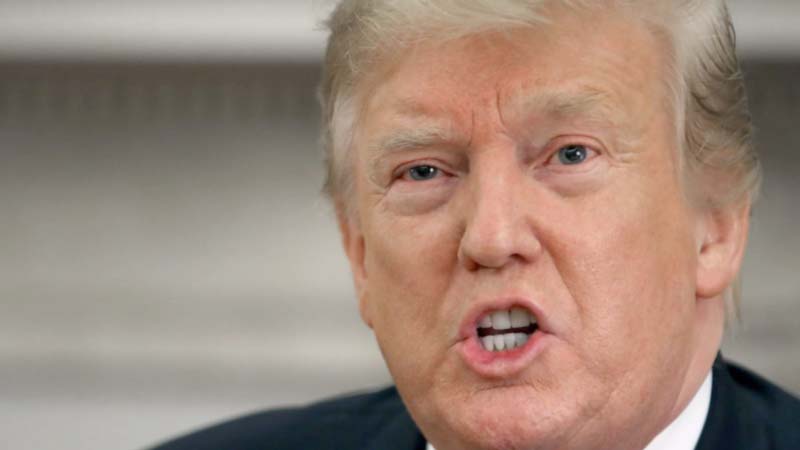He’s blown America’s credibility
By Samantha Vinograd
Sowing mistrust has consequences. President Donald Trump has sown mistrust by questioning his own intelligence community, withdrawing from critical international coalitions and spreading disdain for the media. And now, as questions about US intelligence regarding Iran abound, Trump is seeing the fruits of his labor. After all, if Trump doesn’t trust his own intelligence community or the media, why should we? Trump’s made his bed
As tensions with Iran escalate, doubts over whether to trust the intelligence community are percolating. But this isn’t a new phenomenon. Last month, the State Department withdrew personnel from Iraq, citing an increased threat from Iran. Shortly after the announcement, there were questions, including from members of Congress, about whether the intelligence cited held water.
Now, fresh debate has ensued regarding Secretary of State Mike Pompeo’s rapid assessment that Iran was responsible for recent attacks on commercial vessels in the Gulf of Oman. The United Kingdom has supported the US assessment, while other allies, like Germany, have taken a more cautious approach.
But the truth is, much of this doubt existed even before Trump became President. Ever since the Iraq War, when the United States launched a military invasion and roped our allies into it based on faulty intelligence, the trust deficit over US intelligence has been high when it comes to the Middle East.
Of course, Trump has not helped matters. He has openly questioned the intelligence community’s assessments on numerous occasions. And his doubts make convincing our allies to trust us that much harder.
Here’s just a few examples. He sided with Russian President Vladimir Putin over the Director of National Intelligence Dan Coats and called his own intelligence community “extremely passive and naive” when they assessed that Iran was not taking steps toward a nuclear bomb and that North Korea will not denuclearize.
And in his recent ABC interview, Trump even threw his FBI director under the bus, saying that Christopher Wray was wrong when he said candidates should call the FBI if foreign governments contact them. Because he questions the intelligence community’s analysis on everything that doesn’t align with his personal agenda, he may be leading by example on Iran.
In fact, Trump has called previous assessments on Iran “naive,” but this time around, when their assessments match his personal views — and desire to take decisive action against Iran — he now trusts the intelligence community and expects everyone else to do so, too. When it comes to sowing mistrust in the intelligence community, Trump’s made his bed. But lying in it may be more uncomfortable than he anticipated.
The morning after
Trump hasn’t just sown mistrust of the intelligence community — he’s also sown mistrust of American reliability. If the administration can overcome the challenges that Trump has created, the difficult job of figuring out how to hold Iran accountable for what the administration says they did — without escalating the situation further — will be the immediate task at hand. Here too, however, Trump’s own record of sowing mistrust will make his team’s jobs more difficult.
Once an intelligence assessment is agreed upon, policy experts typically try to punish bad behavior and deter more of it going forward. Any US efforts are bolstered if we can get other countries to work with us. We often try to build coalitions of countries to do things like issue sanctions or even move more of their own military resources.
We do this because multilateral efforts send a stronger symbol of resolve, and benefit from greater resources. In this case, for example, we could try to encourage other countries to mirror US sanctions which prohibit things like purchasing Iranian oil and also target Iran’s export revenues from metals and petrochemical exports. But because of Trump’s own track record of wielding big sticks when it personally suits him, and then putting them down based on his mood that day, we are no longer viewed as a trustworthy partner.
Since assuming office, Trump has withdrawn from the Paris Climate Accord, the Trans-Pacific Partnership and the Intermediate-Range Nuclear Forces Treaty — just to name a few. In other words, the cost-benefit analysis of supporting US foreign policy initiatives is far more complex.
Countries may question whether working with the United States is a lot of pain and no gain. And consider this: we asked our allies to work with us on the Iran deal. They did, and then we withdrew from it — so getting them on board with more coordinated action on Iran will be more difficult.
Words matter
One of Trump’s favorite hobbies is urging distrust of the mainstream media. Just this weekend, Trump accused the New York Times of crimes that are punishable by death, tweeting that the New York Times engaged in “virtual treason” when it published a story on our cyber operations against Russia.
Saying that the news is “fake” when it doesn’t parrot his personal talking points means he’s encouraging others not to believe what they’re seeing or reading in the media. But that creates problems for his team. When there is an actual policy they are trying to push out, or an intelligence assessment the administration wants people to believe, they have a harder time convincing Americans that what the media is reporting is something they should believe.
To mitigate the unintended consequences of Trump’s mistrust mission, our intelligence community, our diplomats and our journalists are going to have to work harder behind the scenes. They’ll have to make an even stronger intelligence case regarding what we know Iran has done — and is planning to do — while somehow trying to convince our usual partners that Trump can be trusted this time.
Samantha Vinograd is a CNN national security analyst. She served on Barack Obama’s, NSC from 2009 to 2013 and at the Treasury Department under President George W. Bush. The views expressed in this commentary are her own.


